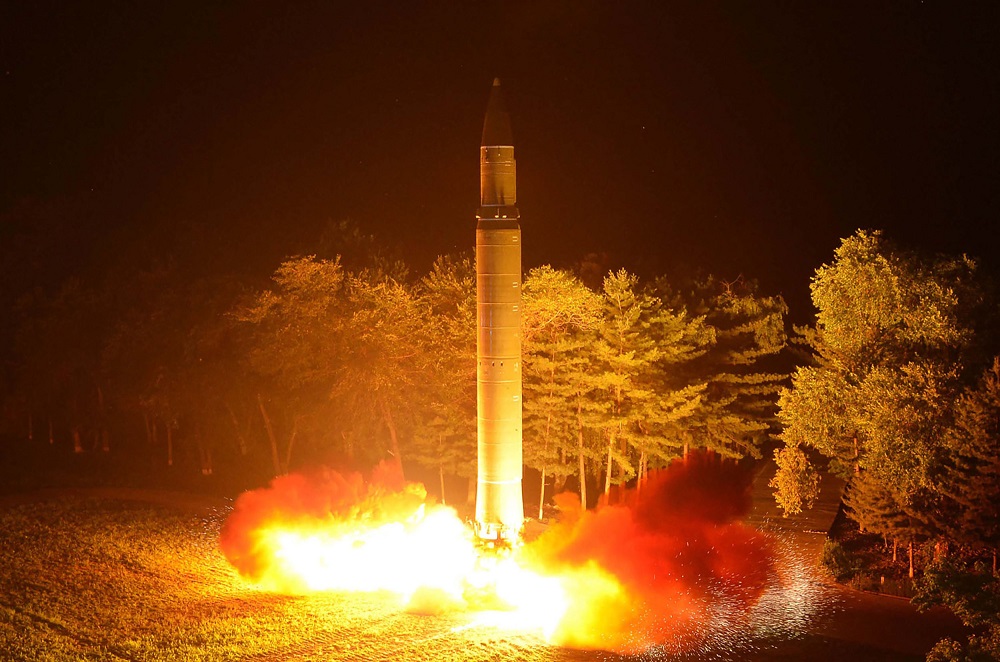North Korea rejected on Monday the latest sanctions imposed by the United Nations, deeming them a “violent violation of our sovereignty”, Pyongyang said in a statement carried by its official Korea Central News Agency.
It insisted that the sanctions will not deter it from developing its nuclear arsenal, warning that it would not negotiate while being threatened by the United States.
The message of defiance was the first major response to the US-drafted sanctions that the UN Security Council unanimously approved over the weekend that could cost North Korea $1 billion a year while restricting crucial economic links with China.
“We will not put our self-defensive nuclear deterrent on the negotiating table” while it faced threats from Washington, Pyongyang said, “and will never take a single step back from strengthening our nuclear might”.
North Korea threatened to make the United States “pay the price for its crime… thousands of times”.
US President Donald Trump took to social media to hail the vote, thanking Russia and China in a Twitter post for backing the sanctions that either could have halted with their UN veto.
Trump said he was “very happy and impressed with 15-0 United Nations vote on North Korea sanctions”.
The Pyongyang statement came as its Foreign Minister Ri Yong-Ho was in the Philippine capital of Manila for a security forum with the top diplomats from the United States, China, Russia and other Asia-Pacific nations.
US Secretary of State Rex Tillerson on Monday ruled out a quick return to dialogue with North Korea, saying the new sanctions showed the world had run out of patience with Pyongyang’s nuclear weapons ambitions.
Speaking to reporters at the forum, Tillerson said Washington would only consider talks if Pyongyang halted its ballistic missile program.
“The best signal that North Korea could send that they’re prepared to talk would be to stop these missile launches,” he said.
Tillerson held out the prospect of US envoys at some point sitting down with Pyongyang’s isolated regime and avoiding war, although he refused to say how long the North might have to refrain from testing more long-range missiles.
“I’m not going to give someone a specific number of days or weeks. This is really about the spirit of these talks,” he said.
The sanctions were in response to the North conducting its first two intercontinental ballistic missile tests last month that Kim boasted showed he could strike any part of the United States.
Tillerson’s remarks followed a rare exchange on Sunday between Ri and his South Korean counterpart, Kang Kyung-Wha, at a dinner to welcome all the foreign ministers.
Kang urged Ri to accept Seoul’s offers of military talks to lower tensions on the divided peninsula and for discussions on a new round of reunions for divided families, according to South Korea’s Yonhap news agency.
But Yonhap reported that Ri retorted: “Given the current situation in which the South collaborates with the US to heap pressure on the North, such proposals lacked sincerity”.
Trump and his South Korean counterpart, Moon Jae-In, spoke on the phone on Sunday and agreed the North “poses a grave and growing direct threat”, according to a White House statement.
Moon and Trump said they would continue cooperating to rein in North Korea, particularly ahead of a regular joint military drill set for late August. North Korea has long accused the United States and South Korea of escalating tensions by conducting military drills.
North and South Korea are technically still at war because their 1950-53 conflict ended in a truce, not a peace treaty.
Later on Monday, the US, Australia and Japan urged the international community to pressure North Korea to abandon its “threatening and provocative path” and apply additional diplomatic and economic measures on Pyongyang over its missile tests.
In a joint statement at the end of a meeting of their foreign ministers on the sidelines of the Manila meeting, the three countries said new sanctions on North Korea should be strictly implemented.
They said they were committed to sanctions and to providing help in implementing them, including export controls.
